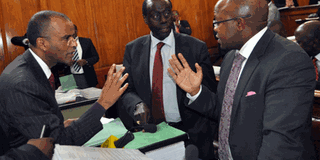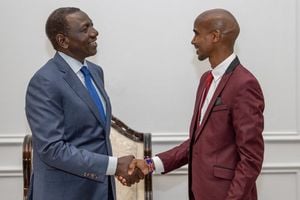Media firms ‘entitled to’ licences

Lawyers Philip Murgor (left) Paul Muite (centre) and Issa Mansur (right) for Nation Media Group (NMG), Standard Media Group (SMG) and Royal Media Services (RMS) during digital migration hearings at the Supreme Court in Nairobi on August 1, 2014. PHOTO | ANTHONY OMUYA
What you need to know:
- Lawyers Paul Muite, Issa Mansur, Kiragu Kimani, Ochieng Oduol and Philip Murgor, representing the companies, said it was ironical for the government to advocate patriotism through support of local industries while favouring Chinese firms for the licences.
- Mr Muite said the Court of Appeal had concluded that the government had violated the rights of the media houses.
Three media owners have accused the government of reneging on a promise to issue them with a digital television broadcast licence.
Nation Media Group, Standard Media Group and Royal Media Services yesterday told the Supreme Court that government officials and a taskforce on digital migration agreed that their existing multi-billion shilling infrastructure should not go to waste and recommended they be issued with a licence.
Lawyers Paul Muite, Issa Mansur, Kiragu Kimani, Ochieng Oduol and Philip Murgor, representing the companies, said it was ironical for the government to preach patriotism through support of local industries while favouring Chinese firms for the licences.
Mr Mansur argued that the Court of Appeal ordered the government to issue the organisations with the licence because the firms had a legitimate expectation based on the promise and their massive investment.
He said the companies wanted to be allowed to roll out digital signals just like the Kenya Broadcasting Corporation.
He reiterated that the firms were not opposed to digital migration but were only aggrieved that they were denied the permit yet a Chinese company was given.
“The government, from 2007, made a commitment to exempt existing media houses from procurement of digital licences and it should be held accountable to its word, to promote public confidence,” Mr Mansur said.
Mr Muite said the Court of Appeal had concluded that the government had violated the rights of the media houses.
“The order granting us a licence was a consequence of a finding that Communication Commission of Kenya (CCK) was not the right body to issue the licence.
“It was the same consequence which made the Appellate judges to cancel the licence issued to Startimes Media,” he said. Denying their clients the permit was an attempt to control the media and return Kenya to the days of repression, he argued.
PERSONAL INTERESTS
However, the CCK said it had the exclusive mandate to formulate broadcast regulations and to issue licences, and not the court.
“The court does not have the tools to determine the number of signal regulators that should be in the market,” said Mr Wambua Kilonzo, the regulator’s lawyer.
Mr Kilonzo told the judges that the media houses were motivated by personal interests and not public interest.
“The moment you give them a licence, the question whether those digital boxes are affordable will no longer be an issue,” he told the judges, in reference to the companies’ arguments that the signal converters were unaffordable to many viewers.
The lawyer said no organisation can claim to have a legitimate expectation of a licence. “Issuance of a licence depends on several factors and if
organisations can claim they have legitimate expectation to be issued with a licence, then every organisation will be entitled to a licence.”
Mr Mwangi Njoroge, a state lawyer, accused the media houses of seeking to wrongly equate freedom of expression to freedom to broadcast.
However, lawyer Kiragu Kimani argued that the companies sought the court’s intervention as a matter of right and not to protect their commercial interests.
“There is a distinction between commercial interest and commercial rights. In any event, there is nothing wrong with a party approaching the court to protect its commercial rights as guaranteed by the Constitution,” he said.
Mr Oduol, his counterpart, accused the government of creating illegal regulations that he said had resulted into violation of media freedom through biased issuing of digital broadcast licences.
Mr Murgor told the judges that it was wrong for the CCK and the Attorney-General to claim that the law only allowed two digital content providers.
The lawyers further defended the Appellate court for extending the deadline for digital migration to September 30.
“Even if we don’t comply with the June 2015 deadline, the Supreme Court has the power to direct the government to request for an extension of the deadline for additional five years,” said Mr Mansur.
The Consumers Federation of Kenya urged the court to order for a national civic education on the migration before it is implemented.
The hearing ended yesterday and the parties are awaiting a ruling.





